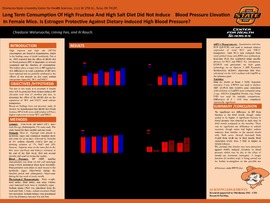| dc.contributor.author | Waturuocha, Chiedozie | |
| dc.contributor.author | Fan, Liming | |
| dc.contributor.author | Rouch, Al | |
| dc.date.accessioned | 2020-04-14T16:12:38Z | |
| dc.date.available | 2020-04-14T16:12:38Z | |
| dc.date.issued | 2019-02-22 | |
| dc.identifier | ouhd_waturuocha_longterm_2019 | |
| dc.identifier.citation | Waturuocha, C., Fan, L., & Rouch, A. (2019, Feb. 22). Long term consumption of high fructose and high salt diet did not induce blood pressure elevation in female mice. Is estrogen protective against dietary-induced high blood pressure? Poster presented on Research Day at the Oklahoma State University Center for Health Sciences, Tulsa, OK. | |
| dc.identifier.uri | https://hdl.handle.net/11244/323873 | |
| dc.description.abstract | Introduction: High fructose and high salt (HFHS) consumption are linked to hypertension, which is now the leading cause of death worldwide. Results from a previous study showed that the effect of HFHS on blood pressure (BP) is dependent on the concentration and duration of consumption. Sex differences in BP regulation are partially attributed to the effects of sex steroids on key renal sodium transporters. | |
| dc.description.abstract | Hypothesis: We hypothesized that HFHS would induce BP elevation in male and female mice, however, females will have higher expression of renal NCC/NKCC during long-term HFHS diet consumption. | |
| dc.description.abstract | Methods: Four-week-old male and female CD-1 mice (n= 6/group) were placed in metabolic cages and consumed standard chow and water for seven days, followed by 3months of 4% sodium chloride (NaCl) diet and a drinking solution of 1% NaCl and 20% fructose. Separate mice on the same diet in bins were sacrificed and kidneys extracted at the end of the first week, first and second months, and used for molecular studies. | |
| dc.description.abstract | Results: Females expressed higher mRNA levels of NCC and NKCC throughout the study with fold difference of two or higher. Systolic BP averaged weekly and analyzed via ANOVA showed no sex difference in BP from baseline to the third month. Males showed an increase in BP in the third month compared to baseline (123.6 ± 3.6mmHg and 106.3 ± 5.4mmHg, P< 0.5 respectively). There were no sex differences in sodium retention. | |
| dc.description.abstract | Conclusion: Females have protection against HFHS induced BP elevation and estrogen may have a protective role. | |
| dc.format | application/pdf | |
| dc.language | en_US | |
| dc.publisher | Oklahoma State University Center for Health Sciences | |
| dc.rights | The author(s) retain the copyright or have the right to deposit the item giving the Oklahoma State University Library a limited, non-exclusive right to share this material in its institutional repository. Contact Digital Resources and Discovery Services at lib-dls@okstate.edu or 405-744-9161 for the permission policy on the use, reproduction or distribution of this material. | |
| dc.title | Long term consumption of high fructose and high salt diet did not induce blood pressure elevation in female mice. Is estrogen protective against dietary-induced high blood pressure? | |
| osu.filename | ouhd_waturuocha_longterm_2019.pdf | |
| dc.type.genre | Presentation | |
| dc.type.material | Text | |
